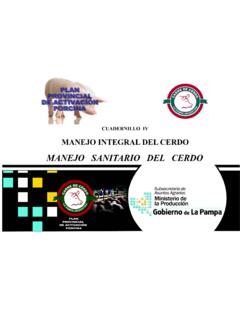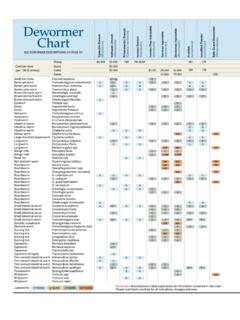Transcription of EQUINE RECOMMENDED DEWORMING SCHEDULE
1 ADULT HORSE SCHEDULEn LOW SHEDDERS (<200 EPG eggs per gram of manure)Fecal Egg Count performed prior to DEWORMING in spring (ideally spring and fall) SPRING (March) ivermectin (Equell , Zimectrin , Rotectin , IverCare ), moxidectin (Quest ) FALL (October) ivermectin w/praziquantel (Equimax , Zimectrin Gold ) or moxidectin with praziquantel (Quest Plus ) n MODERATE SHEDDERS (200 500 EPG)Fecal Egg Count performed prior to DEWORMING in spring (ideally spring and fall) SPRING (March) Ivermectin (Equell , Zimectrin , Rotectin , IverCare, etc), moxidectin (Quest ) LATE SUMMER (July) ivermectin FALL (OCTOBER) ivermectin w/praziquantel (Equimax , Zimectrin Gold ) or moxidectin with praziquantel (Quest Plus )n HIGH SHEDDERS (>500 EPG)Fecal Egg Count performed prior to DEWORMING in spring and fall to monitor for signs of resistance SPRING (March) ivermectin (Equell , Zimectrin , Rotectin , IverCare ), moxidectin (Quest ) SUMMER (June) ivermectin EARLY FALL (September) ivermectin w/ praziquantel (Equimax , Zimectrin Gold ) LATE FALL (NOVEMBER) moxidectinIn general: Check treatment efficacy with fecal egg counts.
2 The treatment recommendations made here are general guidelines based on current drug resistance findings across the world. Other types of dewormer may still be effective on your farm, and can be used if you have determined good efficacy with a fecal egg count reduction SCHEDULE 2 months of age fenbendazole (Panacur) or oxibendazole (Anthelcide) 4-5 months Fecal egg count to track the occurrence of ascarids versus strongyles. Treat for ascarids with fenbendazole (Panacur) or oxibendazole (Anthelcide). Treat with ivermectin for strongyles at approximately 5 months Treat with ivermectin plus praziquantel before the end of the calendar year As short yearlings, check fecal egg count for presence of ascarids and treat those with fenbendazole or oxibendazole if present During the yearling year, treat for strongyles approximately 3 times with ivermectin followed by one treatment with moxidectin plus praziquantel by the end of the grazing season.
3 Check treatment efficacy with fecal egg count reduction testsEQUINE RECOMMENDED DEWORMING SCHEDULE * All egg count thresholds given here are guidelines and based on the range of counts typically generated by the McMaster FIELD SERVICEDEWORMING PROTOCOL GUIDELINESSome of the important points and recommendations are:1. Non-chemical parasite management: Rotate pastures Cross graze pastures with ruminants if possible Remove manure frequently Harrow/drag pastures in hot/dry weather and keep horses out for 2 months Avoid overstocking pastures2. Measure the success of parasite control by doing fecal analysis at least once a year. Fecal egg count an estimate of the number of parasite eggs shed by the horse Talk to your veterinarian before doing a fecal analysis to be sure enough time has passed since your horse s last DEWORMING for eggs to have reappeared in the feces.
4 This Egg Reappearance Period differs depending on the dewormer used. Fecal egg count reduction test worm egg count should decrease 90% when measured 14 days after DEWORMING , depending on the product used. 3. Treat for tapeworms once a year with use of a dewormer containing praziquantel (Zimectrin Gold or Quest Plus ).4. In their encysted larval stage, small strongyles (cyathostomes) are only susceptible to a couple dewormer categories. Given drug resistance findings world-wide, moxidectin (Quest) would be drug of choice in most cases. Treatment for the encysted larvae are RECOMMENDED in the fall near or at the end of the grazing season, before going into the Don t use the same pasture or paddocks year after year for mares and foals.
5 This allows build-up of a high level of ascarid eggs, which can survive between years and infect new foals being born in the : The two parasites of most concern in adult horses are the small strongyles (encysted strongyles, cyathostomes) and tapeworms. In young horses the parasite of biggest concern is the ascarid. The best way to determine the DEWORMING SCHEDULE for your horse is to involve your veterinarian and to perform fecal egg counts (FEC) to determine: 1) Dewormer efficacy in your EQUINE operation, 2) monitor for presence of ascarids in young horses, and 3) identify low, medium or high strongyle egg shedders among adult horses. A surveillance-based DEWORMING program allows the use of less dewormer, can save money, and ensures that the program is effective.
6 EQUINE FIELD SERVICEFor more information, call CSU EQUINE Field Service at (970) 297-5000.






